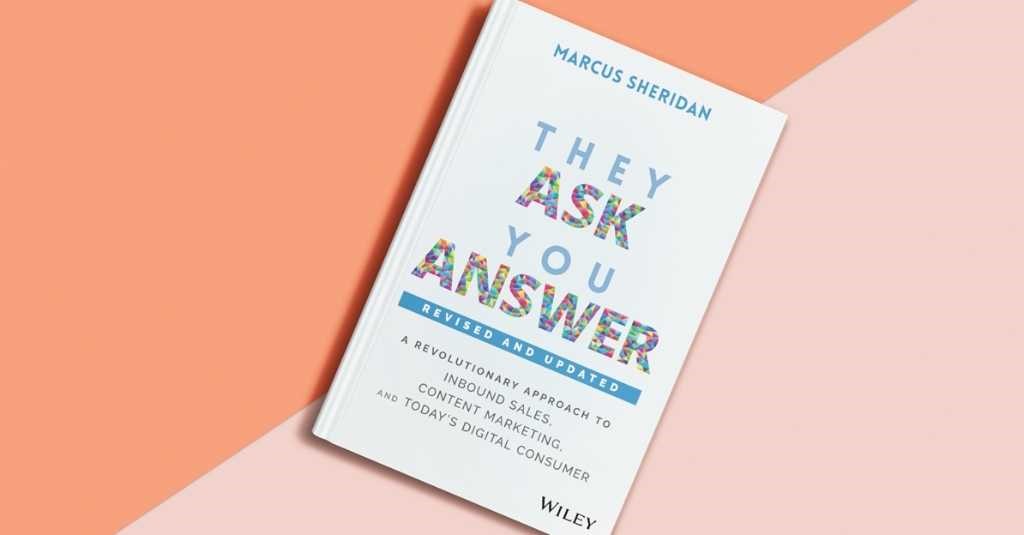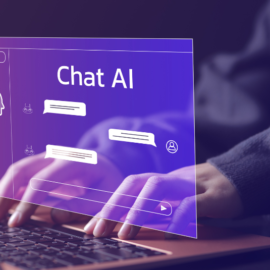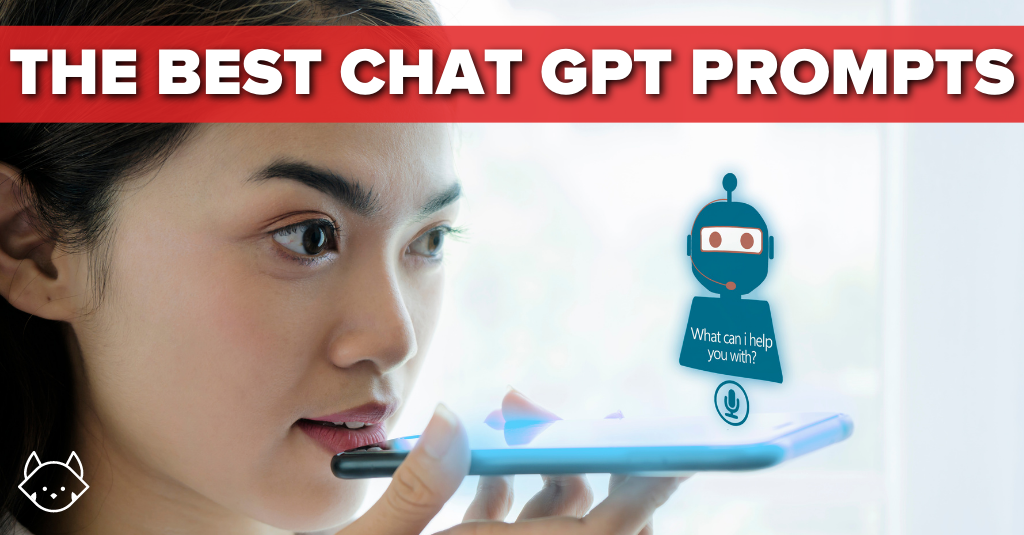AI is trending at the moment and for good reason. ChatGPT hit the internet by storm and now everyone is wondering ‘what’s next?’ The thing is, that “next” has already happened, you just may have not heard about it yet. There are countless AI tools available for various business functions; marketing, sales, content creation, design, and now, SEO as well. In this article, you’ll learn about the best AI SEO tools in 2023.
As an avid content marketer and a lover of new technology myself, AI tools excite me. But it’s about more than excitement.
It’s about business growth. It’s about leverage. It’s about figuring out how you can use what’s available to you to solve problems faster and better.
And that’s exactly what AI helps you do. Solves problems – the same problems you’re currently trying to solve – faster and better.
I want to read out a quote for you from ‘Marketing and Artificial Intelligence’ by Paul Roetzer:
“It’s no easy feat to grow a brand’s organic traffic by a factor of fifteen. It’s even harder to do that in less than six months. And it seems downright impossible to do it when your core audiences span a variety of business functions, including marketing, sales, and project management. That is unless you have artificial intelligence on your side.”
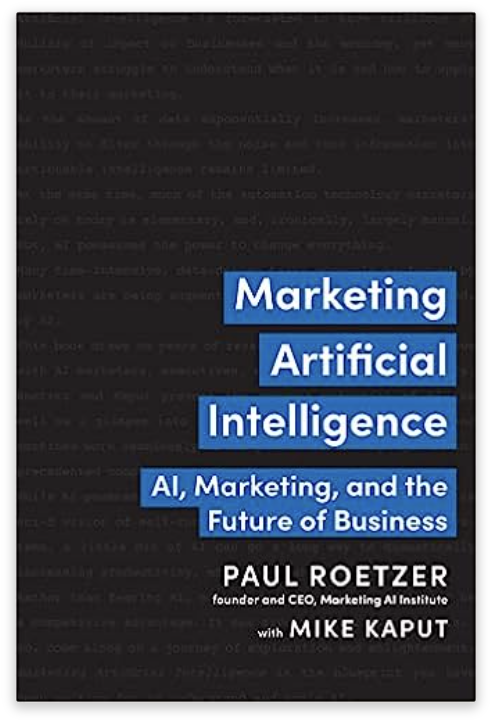
As I said, AI tools help you solve problems faster and better. So, what are some use cases of AI in SEO and what specific tools should you use? In this article, you’re going to find out.
The Monday.com SEO Story: Does AI even impact SEO Results?
Monday.com is a project management tool that increased their search traffic by a stunning 1570% over just a few months. Did AI have any impact on this, and if so, what impact did it have?
Before these extraordinary results, the company relied on manual keyword research and SEO briefs. The process produced high quality content, but it was time consuming, and so they turned to an AI tool known as MarketMuse.
MarketMuse uses AI to optimise content for searches, but unlike other SEO software, it doesn’t give you generic keyword and ranking information. Instead, it provides you with a list of SEO opportunities that are unique to your website and recommends which ones to produce content for. On top of this, it also builds briefs for you to show you exactly how to write content that ranks.
Monday.com essentially used this tool to automate their entire research and briefing process, and as a result were able to save time and ramp up on the content creation process.
This resulted in over 100 SEO optimised articles being published per month and a 1570% increase in search traffic.
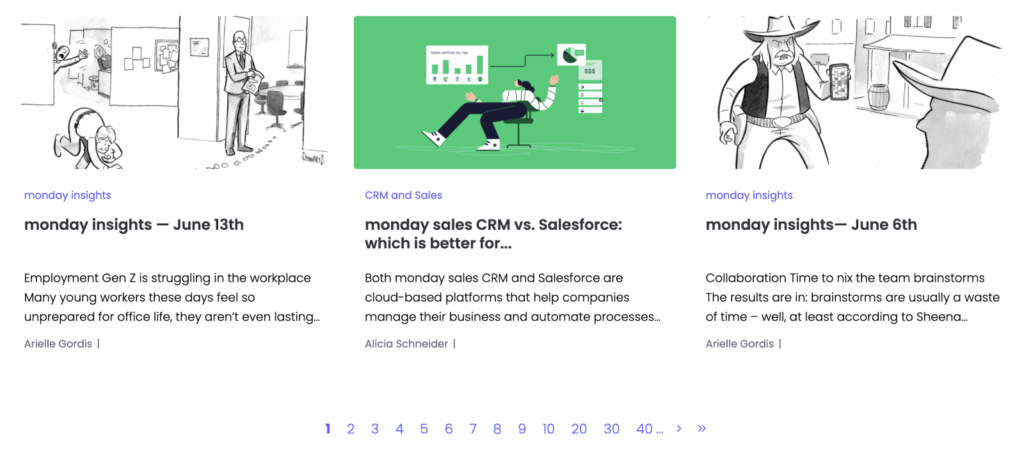
In this case, AI had an enormous impact on Monday.com’s SEO results. But it wasn’t simply that the AI tool helped them write better content – it was that it helped them scale their current output by saving time and leveraging the power of the AI tool.
And that’s what AI is all about. Leverage.
Why is AI Essential for SEO?
Every search engine’s goal is to serve the user the perfect answer to their query. This goal has not changed since the beginning of the search engine, however, the way search engines go about achieving this goal has changed.
In the past, you could get results by writing content with SEO keywords baked into your writing. When showing search results to their users, search engines would take into account what content is most relevant based on these keywords.
Now, however, it’s a completely different story. Search engines, including Google, use a multitude of factors to determine what search result to show for different queries.
For example, Google will take into account the user’s keyword search, the user’s location, and a bunch of different factors used to measure the usability, relevance, and helpfulness of the website content.
In order to rank on Google, you’ll have to work on:
- Keyword research
- Finding and prioritising ranking opportunities
- Creating content that ranks
- Optimising existing content to rank better
- Conducting technical audits
- Addressing issues with page speed and usability
- Optimising sites and content for mobile
- Building and executing voice strategies (for voice search optimisation)
- Creating voice content
This takes a large amount of labour to do, and only scratches the surface of what’s possible.
The bottom line: humans alone can’t keep up.
Initially, brands turned to SaaS platforms to assist in their SEO efforts. However, these software are ultimately limited in what they can do.
| What SaaS Can Do For SEO | What SaaS CAN’T Do For SEO (But AI Can Do) |
| Make it easier to find and extract data | Cannot adapt if search engine algorithms change or new channels become essential |
| Offer better insight into ranking opportunities and gaps | Cannot take into account specific context around your site and search presence |
| Basic optimisation recommendations based on best practices | Cannot make valuable predictions about search performance beyond offering basic recommendations |
AI can do all of these things and more. Ultimately, by using AI for SEO, you can reduce the need for heavy labour and achieve extraordinary results, similar to the Monday.com story I shared earlier.
Use Cases of AI in SEO
So what can AI actually do to help when it comes to SEO?
AI can be used in SEO to:
- Conduct predictive keyword research at scale
- Identify opportunities and gaps
- Optimise content for search
- Manage business listings
Let’s take a look at each one.
Conduct Predictive Keyword Research
AI tools for SEO eliminate the need for manual keyword research and enable predictions that weren’t previously possible with traditional software.
In particular, AI tools can recommend search opportunities based on your website’s specific content. This is powerful because it’s actually looking at your unique situation and making recommendations based on that.
On top of this, AI can then show you a difficulty score for each search topic (customised to your specific domain) and can predict search performance and highlight what opportunities your brand should take.
This ultimately reduces the workload significantly and gives you insights and recommendations based on data that humans wouldn’t be able to analyse.
Identify opportunities and gaps
Have you ever wanted to write content on a particular topic but can’t seem to rank for it because there’s just so much competition around that topic?
AI tools can solve this problem by analysing your competitor’s search data to provide insights around:
- Top pages ranking for a topic
- How to address the topic to compete
- Topic areas the competition failed to address
- Predict the search intent behind a topic, which will ultimately help you write better content
Optimise content for search
AI tools can show you exactly what you need to change in your current content to rank higher, or alternatively, can show you how to do it from the start.
It does this by building Smart Content Briefs. These are briefs that tell you:
- What topics you must cover to rank
- Minimum quality and word count level to compete
- Recommends links to include
- Recommends questions to answer
These Smart Briefs are built by evaluating content from your competitors, your website, and search engines. In this way, AI tools are not just providing you with generic recommendations based on online data, but instead personalised recommendations based on your site’s specific content.
Manage business listings
Search engines display business listings that include information around a brand’s address, contact information, and opening hours. Having accurate information here is essential to making sure customers have the right information to act on.
However, keeping listings accurate can be a challenge because changes to listings don’t always update in real time, and it is time consuming to monitor this information across maps, apps, and other places on Google where this information might appear.
AI tools for SEO can help brands manage these listings at scale by automatically detecting listing inconsistencies and inaccurate results, shaving significant time off managing your business listings.
You’ll still have to change the listings when required, but you won’t have to worry about checking that it’s updated or accurate in multiple places (which can be time consuming) because AI will do that for you.
Best 4 AI SEO Tools in 2023
These four AI SEO tools are worth looking into for more information beyond what we’ve provided below. When you’re looking through the features of these tools, consider whether they will help your business either reduce costs or increase revenue.
Best 4 AI SEO Tools in 2023:
BrightEdge
Here’s what BrightEdge can do:
- Provides real time SEO insights
- Recommends what to do to rank
- Forecasts the business impact of search actions
- Conducts keyword research
- Predict traffic gains in relevant topics so you can focus on topics you might rank highly for
BrightEdge does not display their pricing online, however you can request a free trial demo with BrightEdge here.
From a reviews point of view, BrightEdge has a 4.2/5 rating on Capterra and a 4.4/5 rating on G2. Here’s two reviews we found on BrightEdge that we think gives you a pretty good idea of the pros and cons.

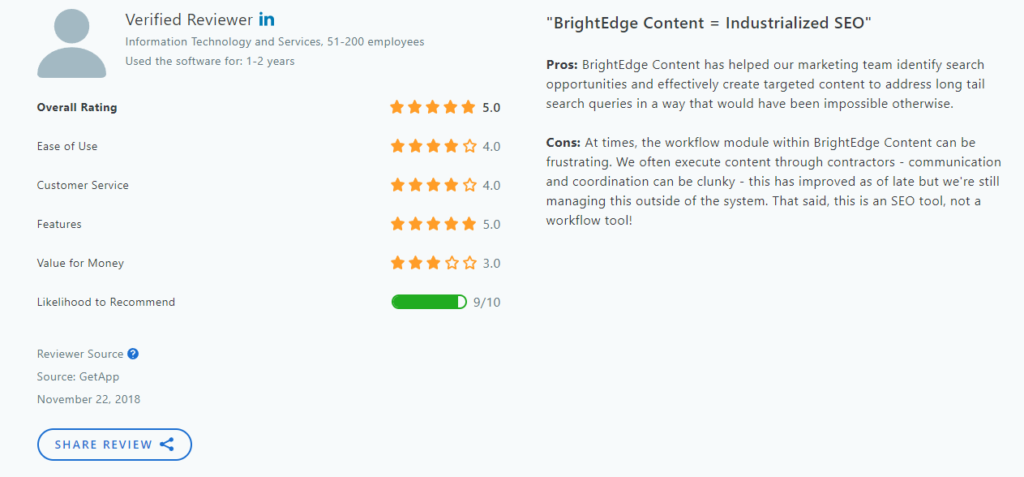
Overall, BrightEdge is a fantastic AI SEO tool to use for your business.
HubSpot
HubSpot has SEO features that use AI. Here’s what it can do for you:
- Brainstorms what to write for higher rankings
- Reads your site content and makes optimisation recommendations
- Reads your site content and provides recommendations on how to structure and link your content
- Helps speed up basic SEO tasks
To use the HubSpot SEO tools, you’ll need to get the HubSpot Marketing Hub. You can check out the cost of HubSpot Marketing Hub here.
Want to learn more about what’s possible with HubSpot? Read our Comprehensive Guide on why you should consider choosing HubSpot for your business.
From a reviews point of view, HubSpot Marketing Hub has a 4.5/5 rating on Capterra and a 4.4/5 rating on G2.
MarketMuse
MarketMuse can help you:
- Read all content on your website and then highlights opportunities to improve existing content and opportunities for new content
- Analyses content from your competitors that ranks well and delivers advice on how to outrank it (a heatmap that includes competitor strengths and weaknesses is included in this)
- Provides you with a personalised difficulty score that shows you which topics are easier and harder for you to rank based on your website content
This AI tool is especially useful because you can focus on investing resources into the content that is most likely to be successful for your brand.
When it comes to pricing, MarketMuse has a free plan, a $149/month plan and a $399 per month plan. If you have custom needs, there is also the option for a custom plan, which does not have a price tag attached.
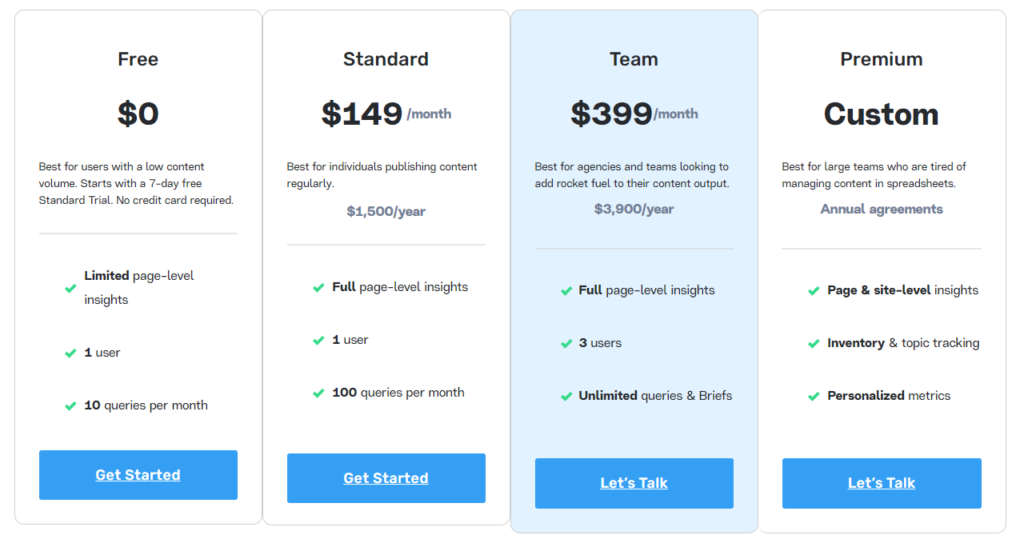
You can see the differences between each plan for MarketMuse in detail here.
From a reviews point of view, MarketMuse has a 4.6/5 rating on Capterra and a 4.6/5 rating on G2. Here are some reviews we found of MarketMuse online:
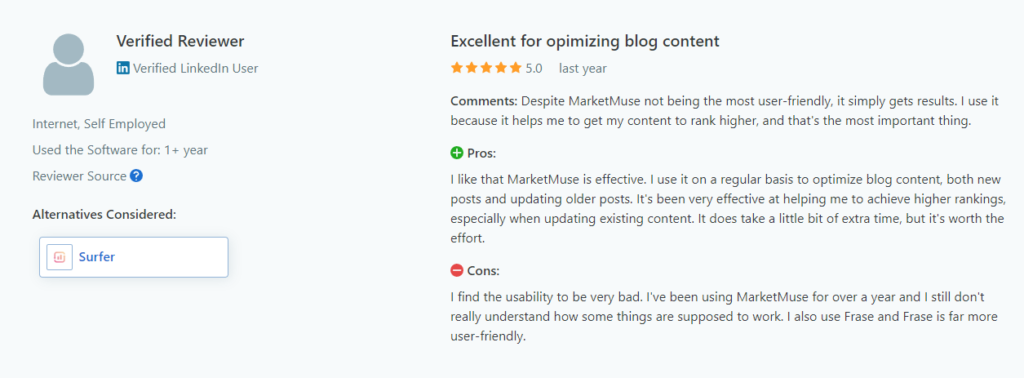

Overall, if you want to use AI to help imprvoe your content creation efforts in regards to SEO, MarketMuse is definitely a great option for you.
Yext
Yext helps keep information across business listings current and accurate across hundreds of platforms.

Specifically, it can:
- Manage your brand’s business listings, online reputation, and reviews
- Optimises your web pages to improve results in search and makes sure the data is formatted properly for both voice and search
- Extracts relevant information from unstructured pages on your site and then serves relevant information to visitors when they search or ask questions
When it comes to pricing, Yext offers four plans:
- $4 per week
- $9 per week
- $10 per week
- $19 per week
Each plan differs in two aspects:
- The level of optimisation that the plan offers for your online listings
- The number of listing channels that Yext includes optimisations for
Here’s a holistic view of the pricing plan:
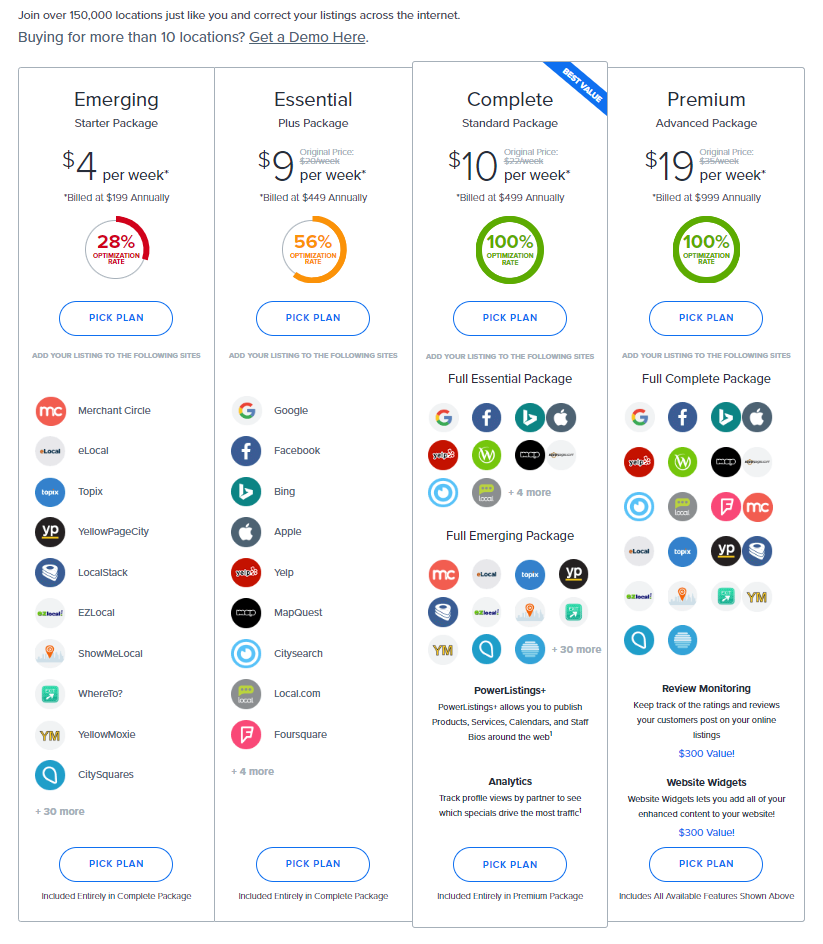
From a reviews point of view, Yext has a 4.3/5 star rating on Capterra and a 4.4/5 rating on G2. For some context, here’s a review that puts into perspective the pros and cons of Yext:

So, what’s next?
If you’re not on top of AI then you’re missing out on an enormous opportunity to save time and resources and generate better results for your brand’s SEO.
When it comes to AI, it goes beyond just SEO and content writing and expands into content marketing, social media, and lead generation.
Check out our article on the Best ChatGPT Prompts to use The Best ChatGPT Prompts for Content Marketing, Social, SEO & Lead Generation (so far).

